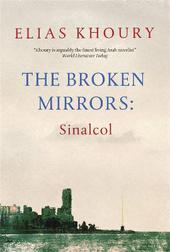
|
The Broken Mirrors: Sinalcol
Paperback / softback
Main Details
| Title |
The Broken Mirrors: Sinalcol
|
| Authors and Contributors |
By (author) Elias Khoury
|
|
Translated by Humphrey Davies
|
| Physical Properties |
| Format:Paperback / softback | | Pages:448 | | Dimensions(mm): Height 245,Width 191 |
|
| Category/Genre | Modern and contemporary fiction (post c 1945) |
|---|
| ISBN/Barcode |
9780857053640
|
| Classifications | Dewey:892.737 |
|---|
| Audience | |
|---|
|
Publishing Details |
| Publisher |
Quercus Publishing
|
| Imprint |
MacLehose Press
|
| Publication Date |
5 February 2015 |
| Publication Country |
United Kingdom
|
Description
Why did he return to Beirut? Why did Karim leave his wife and children and the life he had built in France to return to a homeland still reeling from war? It was not to answer his brother Naseem's call and raise a hospital out the ashes; it was not to pursue past sweethearts and father the son his wife never gave him. It was to find a man, or the ghost of a man, a man known only as Sinalcol, legendary hero of then civil war, and a broken mirror of himself. In Beirut Karim will confront the fate of old comrades, the truth about his father's death and a brother who is all but a twin in appearance but shares nothing of his soul. And he will learn that peace is only ever fleeting in a war without end.
Author Biography
Elias Khoury is Editor-in-Chief of the cultural pages of the daily newspaper Al-Nahar in Beirut and professor of Arabic literature at New York University. In 2000, he was awarded the Palestinian literary prize for Gate of the Sun. Humphrey Davies' previous translations include Elias Khoury's Gate of the Sun, for which he won the Banipal Prize.
ReviewsLos Angeles has Joan Didion and Raymond Chandler, and Istanbul, Orhan Pamuk. The beautiful, resilient city of Beirut belongs to Khoury - Laila Lalami, Los Angeles Times Khoury [is] arguably the finest living Arab novelist - World Literature Today Elias Khoury is an artist giving voice to rooted exiles and trapped refugees, to dissolving boundaries and changing identities, to radical demands and new languages - Edward Said
|